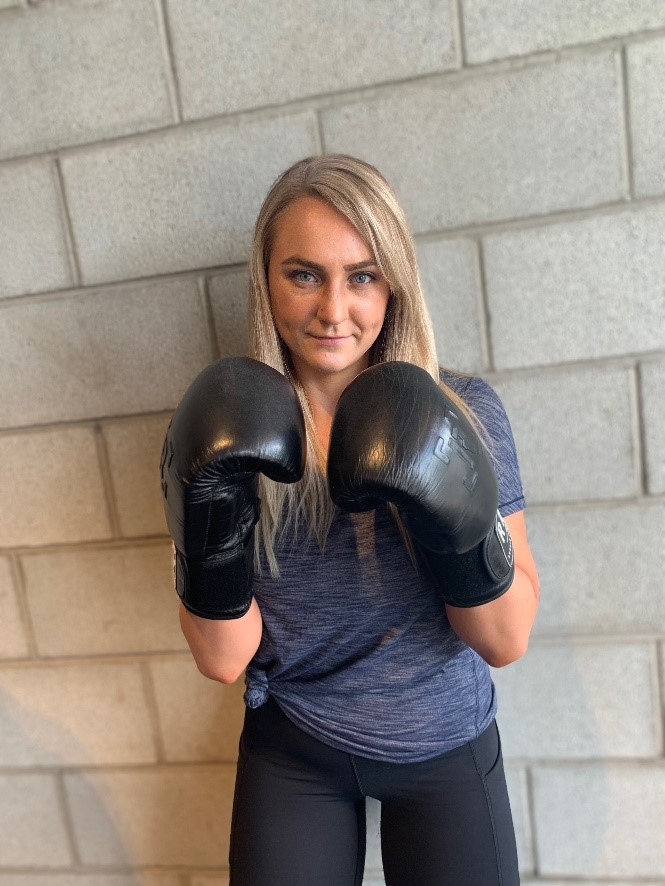“You’ll never be more than a 70s student.”
– Some Grade 12 math teacher in Calgary, one time
 Melissa Mueller is a fighter. Figuratively speaking, that is, in that she’s determined and focused. In Grade 10, a friend mentioned in passing that she was able to talk to Melissa about her problems without fear of everyone else finding out. She decided at that moment, in Grade TEN, she would become a psychologist. Two years later, her Grade 12 math teacher told her she’d never get better marks than 70s. She determined then and there that her goal would be to obtain a PhD. She’s currently a few steps away from obtaining a PhD in psychology.
Melissa Mueller is a fighter. Figuratively speaking, that is, in that she’s determined and focused. In Grade 10, a friend mentioned in passing that she was able to talk to Melissa about her problems without fear of everyone else finding out. She decided at that moment, in Grade TEN, she would become a psychologist. Two years later, her Grade 12 math teacher told her she’d never get better marks than 70s. She determined then and there that her goal would be to obtain a PhD. She’s currently a few steps away from obtaining a PhD in psychology.
Melissa is also a fighter – literally. She is a boxer, and trains at a local gym in Calgary (Rumble) when she’s not at school. “It’s a way to blow off some steam”, she says – and as busy as Melissa is, it’s important to make time for self-care and relieve the pressures of school, practicums, COVID, and everything else.
As it has for almost all of us, COVID has created some stress for Melissa. As she returns to the University of Calgary in the fall, all her classes are now online. But as a TA, she does have to go to the campus to teach a lab. As a school and applied child psychology student, any practicum that she does will likely be in a school setting as schools re-open with a lot of uncertainty. And as the CPA Graduate Student Affairs Officer, the process of recruitment, retention, and communication with Graduate Student Representatives across Canada has changed a good deal as well.
TAKE FIVE with Melissa Mueller
What is the psychological concept that blew you away when you first heard it?
Something I found out while learning about CBT – which is the way we can separate thought from emotion… that you can change the way you think about things which can change the way you feel about them which can in turn change your behaviour.
You can listen to only one musical artist/group for the rest of your life. Who is it?
Noah Schnacky, a country singer I discovered on TikTok. He’s quite young, so he’ll be building a catalogue for many years and I can hear all the new stuff that way!
Favourite book
Anything by Nicholas Sparks. I think my current favourite is Safe Haven.
Favourite word
“Gregarious”. I had to learn it while studying for the GRE, and I think it sounds amazing.
If you could become an expert at something outside psychology, what would it be?
Interior design. Right now I go to Pinterest for all my ideas, but it would be pretty cool to be able to create spaces with the knowledge and intention to facilitate a certain atmosphere or “feel.”
She always struggled with math in high school. Trying to keep numbers in her head while doing a calculation was not her strong suit, and she would get confused and mess up even relatively easy equations. What turned things around for her was a pretty simple accommodation. At some point in math class, as you start to do more advanced things like algebra, calculus, and trigonometry – they let you have a calculator. Now Melissa no longer had to keep all those numbers in her head, and she could focus on the important stuff – the actual math problems.
It was struggles (and solutions) like these in school that led Melissa down her current path. She is in the School and Child Psychology program, because she knows that all children learn things a little differently. She can empathize with them and wants nothing more than to help them overcome similar struggles to those she herself had when she was younger.
Melissa’s last practicum was at a school for kids with severe disabilities. There were many specialists who worked there, in a holistic environment that took into account the idea than few disabilities exist in a vacuum, and there is often correlation between difficulties. For this reason, the school employed psychologists, speech pathologists, occupational therapists, physiotherapists among others.
This is one of two dream scenarios for Melissa post-graduation. She wants to work in a school with an interdisciplinary team – and also run a private practice where she has more direct personal control over direction, treatment, and outcomes. It seems very likely she will end up doing both, and few people are likely to dissuade her. Or maybe somebody will tell her she can’t do both – which will all but guarantee that she will.
